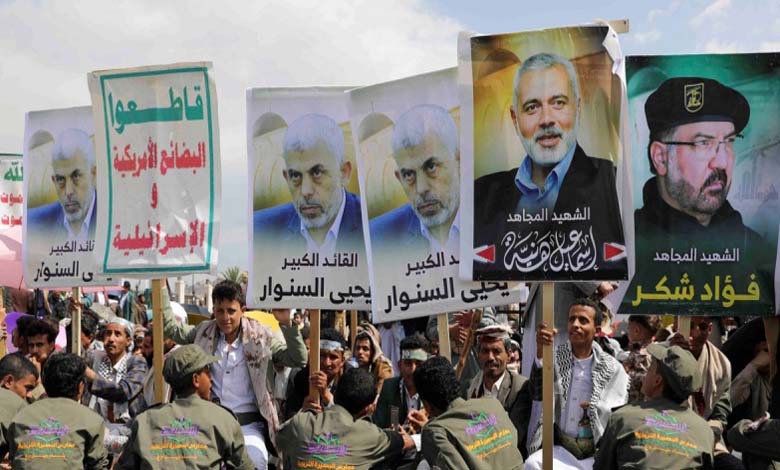New U.S. Sanctions Targeting Yemeni Houthis and Lebanese Hezbollah
The sanctions target companies, individuals, and ships accused of transporting Iranian goods, including oil and liquefied gas, to Yemen on behalf of a network affiliated with a Houthi financial official

The U.S. Department of the Treasury announced that the United States imposed additional sanctions on Thursday, targeting trade networks affiliated with Yemen’s Houthi movement and Lebanon’s Hezbollah group, as Washington increases pressure on Iran and the groups it supports.
-
Yemeni Information Minister: This is a fact of the Houthis’ dependence on Iran and Lebanese Hezbollah
-
US analyst reveals Iran’s plans to serve the interests of Hezbollah and the Houthis to sabotage the region
In a statement, the department said the sanctions targeted companies, individuals, and ships accused of being involved in the shipment of Iranian goods, including oil and liquefied gas, to Yemen on behalf of a network affiliated with a Houthi financial official.
The department added that the revenue from Saeed al-Jamal’s network helps fund the Houthis to target shipping routes in the Red Sea and civilian infrastructure.
-
The Houthis and Somali al- Shabaab: “The Devil’s Alliance” Reaches the Horn of Africa
-
US “Punishes” Houthis: Drones and Control Station Destroyed
Attacks by Iran-allied Houthis on ships in the Red Sea region have disrupted a vital shipping route for trade between East and West, forcing ships to take longer routes, raising shipping costs, and causing congestion at ports in Asia and Europe.
The department also targeted Hezbollah‘s shipments of liquefied petroleum gas on Thursday by adding a Hong Kong-based ship management and operation company and several tankers to the sanctions list.
The department stated that the Talaqi group, controlled by Hezbollah, used two of the tankers to ship liquefied petroleum gas worth tens of millions of dollars from Iran to China.
-
Secretive: Is Iran Training Hezbollah in Qom, Iran and Why?
-
From Iraq and Lebanon to Yemen and then Sudan… Al-Burhan Tilts Iran Militias in Africa
Bradley Smith, Acting Under Secretary for Terrorism and Financial Intelligence, said, “Today’s action underscores our continued commitment to disrupting the flow of funds from Iran’s primary source of financing for its terrorist allies in the region, such as the Lebanese Hezbollah and the Houthis,” adding, “Our message is clear: those who seek to fund the activities of these destabilizing groups will be held accountable.”
Listing individuals and entities on U.S. sanctions lists freezes any assets they may have in the United States and prohibits Americans from dealing with them. Financial institutions that engage with sanctioned individuals in certain transactions also risk falling under sanctions.
-
Iran and the Muslim Brotherhood: Historical relations
-
Dangerous Escalation: Hezbollah Targets Israeli Fighter Jets for the First Time Since the War Began
In Yemen, the U.S. Central Command (CENTCOM) announced on Friday the destruction of a Houthi ground control station.
In a statement on the platform X, CENTCOM said, “Over the past 24 hours, Central Command forces successfully destroyed a ground control station belonging to the Iran-backed Houthis in an area (not specified) under their control in Yemen.”
The statement noted that “the ground control station posed a clear and imminent threat to U.S. forces, coalition forces (Guardian of Prosperity), and commercial ships in the region,” considering that these actions are intended “to protect freedom of navigation and make international waters safer.”
-
Hezbollah Faces Internal Dissent and Divisions
-
Forest Fires in Israel: What is Hezbollah’s Involvement and What are the Consequences?
On Thursday, the Yemeni group announced that the U.S.-British coalition had conducted an airstrike on the Salif area in the Hodeida province, western Yemen, without providing details on the results of the strike.
Claiming to act in “solidarity with Gaza,” which has faced a devastating Israeli war supported by the United States since October 7, the Houthis have been targeting Israeli-linked or Israeli ships with missiles and drones in the Red Sea, Arabian Sea, and Indian Ocean.
-
Secretive: Is Iran Training Hezbollah in Qom, Iran and Why?
-
Hezbollah Strikes Golan Brigade Headquarters with Large Rocket Barrage
Since the beginning of the year, a U.S.-led coalition has carried out raids that it says target “Houthi sites” in various regions of Yemen in response to Houthi maritime attacks, to which the group has sporadically responded.
With Washington and London intervening and tensions escalating in January, the Houthi group announced that it now considers all U.S. and British ships as military targets.












